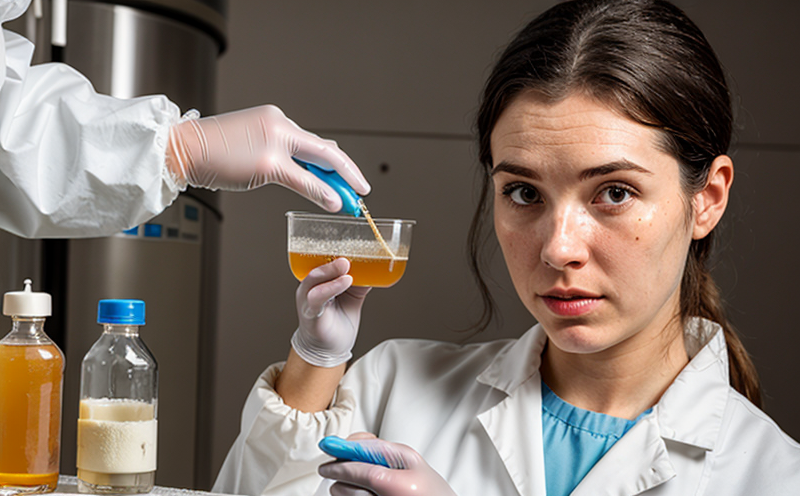Codex Alimentarius Microbiological Criteria for Yeast and Mould
The Codex Alimentarius Microbiological Criteria for Yeast and Mould provide internationally recognized standards aimed at ensuring the safety of food products. These guidelines are essential for quality managers, compliance officers, R&D engineers, and procurement teams working in various sectors such as pharmaceuticals, healthcare, and food production.
Developed by the Codex Alimentarius Commission (CAC), these criteria have been established to address the microbiological safety of foodstuffs that may contain yeasts or molds. The CAC is a joint initiative of the World Health Organization (WHO) and the Food and Agriculture Organization of the United Nations (FAO). Their standards are widely recognized as authoritative sources for food safety practices around the world.
The criteria focus on specific microorganisms like Penicillium, Candida, and Fusarium. These organisms can contaminate a wide range of products, including dairy items, bakery goods, dried fruits, and alcoholic beverages. The presence of these microorganisms in food can lead to quality issues such as spoilage or the production of mycotoxins, which are toxic substances that pose serious health risks.
Understanding the types of yeast and mold present in your products is critical for maintaining compliance with international standards. Our laboratory uses advanced techniques like direct microscopic examination (DME) and culture-based methods to identify these microorganisms accurately. We also employ molecular biology approaches such as PCR (Polymerase Chain Reaction) analysis to provide precise identification.
Our testing process adheres strictly to ISO 16140-2:2013, which specifies the methodology for yeast and mold enumeration in foods. This includes detailed steps for sample preparation, inoculation of selective media, incubation conditions, and final colony count. Our expertise ensures that we can deliver reliable results tailored specifically to your product's needs.
By adhering to these internationally recognized standards, businesses can ensure their products meet regulatory requirements and maintain consumer trust. For instance, in the pharmaceutical industry, ensuring the absence of certain molds like Fusarium is crucial for drug stability and patient safety. In food manufacturing, detecting low levels of yeast or mold early helps prevent costly recalls and protects brand reputation.
To summarize, our service focuses on providing accurate identification of yeasts and molds according to Codex Alimentarius criteria using state-of-the-art techniques. By leveraging this knowledge, businesses can enhance product quality assurance processes and protect public health.
Benefits
- Compliance with International Standards: Ensures adherence to Codex Alimentarius guidelines which are widely accepted globally.
- Promotes Product Safety: Helps in preventing contamination that could lead to health hazards or product spoilage.
- Enhances Consumer Trust: By ensuring safety and quality, businesses can maintain a positive brand image among consumers.
- Reduces Legal Risks: Compliance with these standards helps avoid legal actions related to foodborne illnesses or recalls due to contamination.
Customer Impact and Satisfaction
- Improved Product Quality: Accurate identification of microorganisms ensures that only safe products reach the market.
- Increased Efficiency: Early detection allows for swift corrective actions, minimizing downtime and costs associated with reprocessing or disposal.
- Better Decision-Making: Reliable data helps in strategic planning regarding product development and supply chain management.
- Enhanced Reputation: Consistent quality and adherence to international standards contribute positively to a company’s reputation within the industry.
Eurolab Advantages
At Eurolab, we pride ourselves on delivering exceptional services that exceed expectations. Our team of highly qualified professionals is dedicated to providing accurate and timely results using cutting-edge technology and methodologies. We offer a comprehensive range of services including initial consultation, sample collection guidance, detailed report generation, and follow-up support.
Our state-of-the-art facilities are equipped with the latest equipment necessary for precise analysis. This includes advanced microscopes, automated culture systems, and high-throughput sequencing machines. Our laboratories operate under strict quality management systems certified to ISO/IEC 17025 standards, ensuring consistent accuracy and reliability.
We understand that each client has unique requirements; hence we tailor our services accordingly. Whether you need routine testing or one-off assessments for special projects, Eurolab is committed to meeting those needs efficiently. Our flexible approach allows us to accommodate diverse timelines without compromising on quality.
In addition to technical excellence, we emphasize excellent customer service. From initial contact through final delivery of results, our goal is to make every interaction as smooth and stress-free as possible. Regular communication ensures transparency throughout the process, allowing clients to stay informed at all stages.





